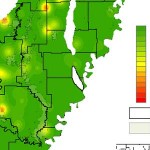
It’s always a fitful sleep when I’m getting up in the middle of the night to go duck hunting in the Arkansas Delta. Saturday night was no different.
I had been at War Memorial Stadium that evening to watch Stuttgart win the Class 4A state high school football championship against Ozark. There’s something fitting about watching the Stuttgart Ricebirds win a state title on the night before a duck hunt, don’t you think?
My thoughts raced back to a state championship game in that same stadium in 1970. I was 11 years old at the time, and Stuttgart upset my beloved Arkadelphia Badgers. I remember that we stopped after the game at the Shoney’s Big Boy on South University Avenue, and I announced to my parents that I was so upset that I wouldn’t go into the restaurant with them. My father informed me in no uncertain terms that I wouldn’t be staying in the car.
As we walked in, we ran into friends from Arkadelphia, one of whom said grimly: “Don’t order the rice tonight. It doesn’t taste good.”
I can remember it as if it were yesterday.
Six years later in 1976, after a Badger team was again upset in a state championship game (this time the opponent was Mena, and I was the starting center for the losing team), my father and I left Arkadelphia late at night and drove to Stuttgart for an early morning duck hunt. Heartbroken by the game’s outcome, I never fell asleep that night. We listened to the Razorbacks on the radio the next afternoon, and my heart broke all over again as Dave Woodman congratulated Mena on the air for its victory.
What is it about state championship games, Stuttgart and me?
I had dozed off at home last Saturday night when the storms moving through central Arkansas woke me up shortly after 11 p.m. At 2 a.m., the thunder and lightning outside woke me up again. From then until the 3:45 a.m. alarm, it was a series of tosses, turns and glances at the clock – fearful, as always, that I would oversleep.
Mindful that bad weather was forecast, Wiley had said he would be up by 4 a.m. and that I should call his cell phone if I wanted to check on the weather at Brinkley. When I called, I got no answer – only a message that the voice mail on the phone had never been set up. “Wiley” is Wiley Meacham, one of this state’s legendary duck guides. He’s 81 now, and I figure anyone above the age of 80 can be forgiven for not setting up the voice mail on a phone.
I was already dressed and wide awake. I figured that, at the worst, I would get a decent breakfast out of the deal. So I headed east on Interstate 40 in the rain, listening to ESPN Radio and fighting the spray from the big trucks that crowd the stretch of interstate between Little Rock and Memphis at any hour. Wiley always insists that guests should arrive no later than 5:30 a.m. at the Piney Creek Duck Club, which is situated along the Monroe County-Lee County line near the tiny community of Monroe.
Along with the 18-wheelers, I occasionally encountered SUVs and pickup trucks pulling boats or trailers with four-wheelers on them. The November and December migration of duck hunters to the fields, sloughs and flooded timber of east Arkansas is as predictable as the coming of Thanksgiving and Christmas in a state that likes to think of itself as the duck hunting capital of the world.
It was still raining when I arrived at Wiley’s farm office, which he has dubbed World Headquarters. We walked over to Don Thompson’s place (Thompson, a longtime Little Rock electrical contractor and one of the finest men I know, is a Piney Creek owner) for a cup of coffee. By the time I finished my first cup, the rain had let up, and the hunters were anxious to get into the flooded green timber.
Two years ago, in a feature story I did on Piney Creek for Arkansas Life magazine, I wrote: “Grown men across America salivate at the thought of an Arkansas duck hunt, sometimes paying thousands of dollars to visit the state’s most famous clubs. It’s a resource most Arkansans take for granted or don’t even know exists, never realizing the millions of dollars invested to turn duck clubs into palaces across east Arkansas. Piney Creek isn’t a palace by any means. But it’s a treasured, secluded place where friends renew a decades-old tradition beginning late each November and continuing through January. They tend to tell the same stories over and over (duck hunting stories get better with age), cuss the politicians and eat well.
“Wiley Meacham of Brinkley, who has been hunting this piece of property for about 70 years, still presides over the activities at Piney Creek. Meacham is emblematic of the breed of men who made Arkansas duck hunting great. The famed guides of the Grand Prairie and the Arkansas Delta have long attracted business from across the country. In places such as North Carolina, Georgia, Alabama and Virginia, the word spread during the 1970s and ‘80s – you want to go to Monroe, Ark., and you want to hunt with a man named Wiley.”
It has been more than a decade since Wiley stopped doing business as a daily guide. I’m among the lucky ones. He invited me to speak to his Rotary Club almost 20 years ago, and we became friends. There’s no way to buy a day of hunting at Piney Creek. You have to be invited by an owner. Wiley, Don and I were joined on this morning by Mickey Prince of Conway, Mickey’s son-in-law and Wiley’s son Steve (who’s among the South’s best callers).
Wiley’s World Headquarters was built in 1974. Its walls are covered with deer racks, newspaper clippings, photos, cartoons, mounted ducks, you name it. On a chalkboard, Meacham records the number of hunters each day and the number of ducks killed. In case you’re wondering, we did well Sunday morning (and we were only rained on hard for about 15 minutes).
Meacham floods about 600 acres of timber each season on a farm that has been in his family for nearly a century. Usually, only one hole per day is hunted. What the regulars refer to as Wiley’s Hole is among the truly special spots in American waterfowl hunting.
Meacham’s father, who was raised near Franklin, Tenn., in the late 1800s, lived out west in Colorado, Idaho and Washington for a time before ending up teaching at Harrisburg in northeast Arkansas. That’s where he met Wiley’s mother, a Harrisburg teacher. He later was selling stoves across the state when he got off the train at Brinkley one day and noticed a posting for a job teaching at Monroe. He took the job, later bought 80 acres and built a two-story house. Wiley was the youngest of four boys. There also were two girls in the family.
Wiley was the only one of the six children to never attend college, but he kept the farm in the family, expanded its operations and became an Arkansas duck hunting legend in the process. Wiley’s father wasn’t a duck hunter, but he was a rice farmer who would send Wiley out to scare off the thousands of ducks eating the rice. Wiley soon discovered that he enjoyed shooting ducks. After years of purchases, Wiley’s father accumulated almost 4,000 acres in the Monroe area.
One of Wiley’s older brothers was killed in 1950 while clearing timber. The father eventually gave the five remaining children 400 acres each while putting 2,000 acres in his wife’s name. The two girls were left swampy land along Piney Creek. They didn’t see value in that land since it wasn’t good for growing crops, but Wiley borrowed money to buy the property from his sisters. He saw what they didn’t: duck hunting potential. Wiley began working as a paid guide in 1973 to pay off the loan.
Mike Huckabee was a regular guest at Piney Creek during his decade as governor. Meacham no longer hunts every day of the season, and a comfortable wooden chair has been built for him in the flooded timber. Meacham claims that he looks forward to the end of duck season, but that’s not true. It’s through duck hunting that he has met people from across the country.
Saturday’s hunt was followed by a late breakfast – a big meal of eggs, bacon, biscuits and gravy. Some of those staying at Piney Creek for another day of hunting later took naps. I left at about noon, but I had one more stop to make.
Another Delta friend, Jessie George of Marvell, had called earlier in the week. I also had written a story on him for Arkansas Life, a piece that centered on the freshwater caviar he buys from commercial fisherman who haul paddlefish, bowfin and shovelnose sturgeon from the Arkansas, White and Mississippi rivers. He distributes the Arkansas caviar nationally. The eggs start coming into George’s Fish Market in late November and continue through March.
“I have some caviar for you for Christmas,” he had told me. “Come over when you’re in the area.”
That invitation was all I needed to drive the extra 25 minutes east on U.S. Highway 49 from Monroe to Marvell.
To help stay awake on the afternoon drive from Marvell back to Little Rock, I listened to football on the radio – first the Tennessee Titans on 680 AM out of Memphis and then the Dallas Cowboys on 920 AM out of Little Rock. In North Little Rock, I left four mallards at McSwain’s Sports Center to be cleaned. Looking at the dozens of ducks waiting to be cleaned, it was obvious that a lot of hunters had had a good morning.
The Christmas Eve menu is now set. We’ll have caviar for an appetizer and wild ducks for the main course. For a native Arkansan who loves his state and likes to eat, it just doesn’t get any better than that.










